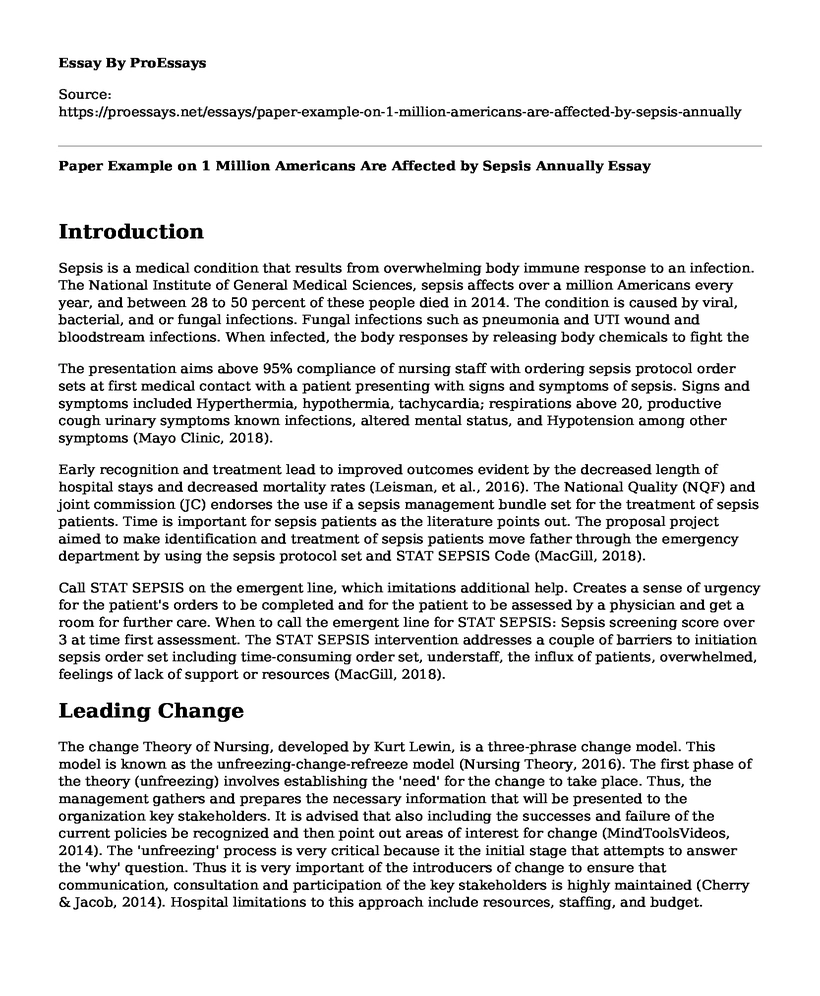Introduction
Sepsis is a medical condition that results from overwhelming body immune response to an infection. The National Institute of General Medical Sciences, sepsis affects over a million Americans every year, and between 28 to 50 percent of these people died in 2014. The condition is caused by viral, bacterial, and or fungal infections. Fungal infections such as pneumonia and UTI wound and bloodstream infections. When infected, the body responses by releasing body chemicals to fight the
The presentation aims above 95% compliance of nursing staff with ordering sepsis protocol order sets at first medical contact with a patient presenting with signs and symptoms of sepsis. Signs and symptoms included Hyperthermia, hypothermia, tachycardia; respirations above 20, productive cough urinary symptoms known infections, altered mental status, and Hypotension among other symptoms (Mayo Clinic, 2018).
Early recognition and treatment lead to improved outcomes evident by the decreased length of hospital stays and decreased mortality rates (Leisman, et al., 2016). The National Quality (NQF) and joint commission (JC) endorses the use if a sepsis management bundle set for the treatment of sepsis patients. Time is important for sepsis patients as the literature points out. The proposal project aimed to make identification and treatment of sepsis patients move father through the emergency department by using the sepsis protocol set and STAT SEPSIS Code (MacGill, 2018).
Call STAT SEPSIS on the emergent line, which imitations additional help. Creates a sense of urgency for the patient's orders to be completed and for the patient to be assessed by a physician and get a room for further care. When to call the emergent line for STAT SEPSIS: Sepsis screening score over 3 at time first assessment. The STAT SEPSIS intervention addresses a couple of barriers to initiation sepsis order set including time-consuming order set, understaff, the influx of patients, overwhelmed, feelings of lack of support or resources (MacGill, 2018).
Leading Change
The change Theory of Nursing, developed by Kurt Lewin, is a three-phrase change model. This model is known as the unfreezing-change-refreeze model (Nursing Theory, 2016). The first phase of the theory (unfreezing) involves establishing the 'need' for the change to take place. Thus, the management gathers and prepares the necessary information that will be presented to the organization key stakeholders. It is advised that also including the successes and failure of the current policies be recognized and then point out areas of interest for change (MindToolsVideos, 2014). The 'unfreezing' process is very critical because it the initial stage that attempts to answer the 'why' question. Thus it is very important of the introducers of change to ensure that communication, consultation and participation of the key stakeholders is highly maintained (Cherry & Jacob, 2014). Hospital limitations to this approach include resources, staffing, and budget.
Leading and sustaining change
Changes theory addresses the unfreezing, moving and refreezing. Steps will be taken by management and charge nurses to move change forward. Assess for readiness to change, driving forces: by creating an environment that promotes frequent change and flexibility. Implementation phase: promote new vision, clear goals. Maintaining change; endorse good behavior, and by showing data of improvement or goals. Barriers to change: view of the importance of change, complexity-changing habit (Nursing Theory, 2016).
Evaluation
Evaluation is mainly done by addressing the barriers to the implementations and nursing practice protocols.by adopting a change process that is aimed at improving the outcomes of patients and those at the risk of being infected with sepsis.
References
Gatewood, M. O., Wemple, M., Greco, S., Kritek, P. A., & Durvasula, R. (n.d.). A quality improvement project to improve early sepsis care in the emergency department. Retrieved from BMJ Quality: https://qualitysafety.bmj.com/content/24/12/787
Leisman, D., B, W., M, D., A, B., MF, W., M, A., . . . JA., Z. D. (2016). Association of Fluid Resuscitation Initiation Within 30 Minutes of Severe Sepsis and Septic Shock Recognition With Reduced Mortality and Length of Stay. Annals of emergency medicine, 298-311.
MacGill, M. (2018, October 23). Sepsis: What you need to know. Retrieved from Medical News Today: https://www.medicalnewstoday.com/articles/305782.php
Mayo Clinic. (2018, November 16). Sepsis. Retrieved from Mayo Clinic: https://www.mayoclinic.org/diseases-conditions/sepsis/symptoms-causes/syc-20351214
Nursing Theory. (2016). Lewin Change Theory. Retrieved from NursingTheory.org: http://www.nursing-theory.org/theories-and-models/Lewin-Change-Theory.php
Cite this page
Paper Example on 1 Million Americans Are Affected by Sepsis Annually. (2023, Jan 16). Retrieved from https://proessays.net/essays/paper-example-on-1-million-americans-are-affected-by-sepsis-annually
If you are the original author of this essay and no longer wish to have it published on the ProEssays website, please click below to request its removal:
- Theory Application Paper: Gerontological Nursing
- Anatomy and Physiology: Speech Language Pathology Paper Example
- Essay Sample on Evidence-Based Practice in Healthcare Settings: Clinical Decision Making
- U.S. Marijuana Use: Federal vs. State Laws - Research Paper
- Essay Sample on Dementia: Symptoms & Challenges of Home-Based Care
- Essay Sample on Ban Conversion Therapy: LGBTQ People Should Not Be Forced To Change
- Gaining Health Assessment Skills: Interviewing Patients on Cardiovascular, Peripheral Vascular & Respiratory Conditions







